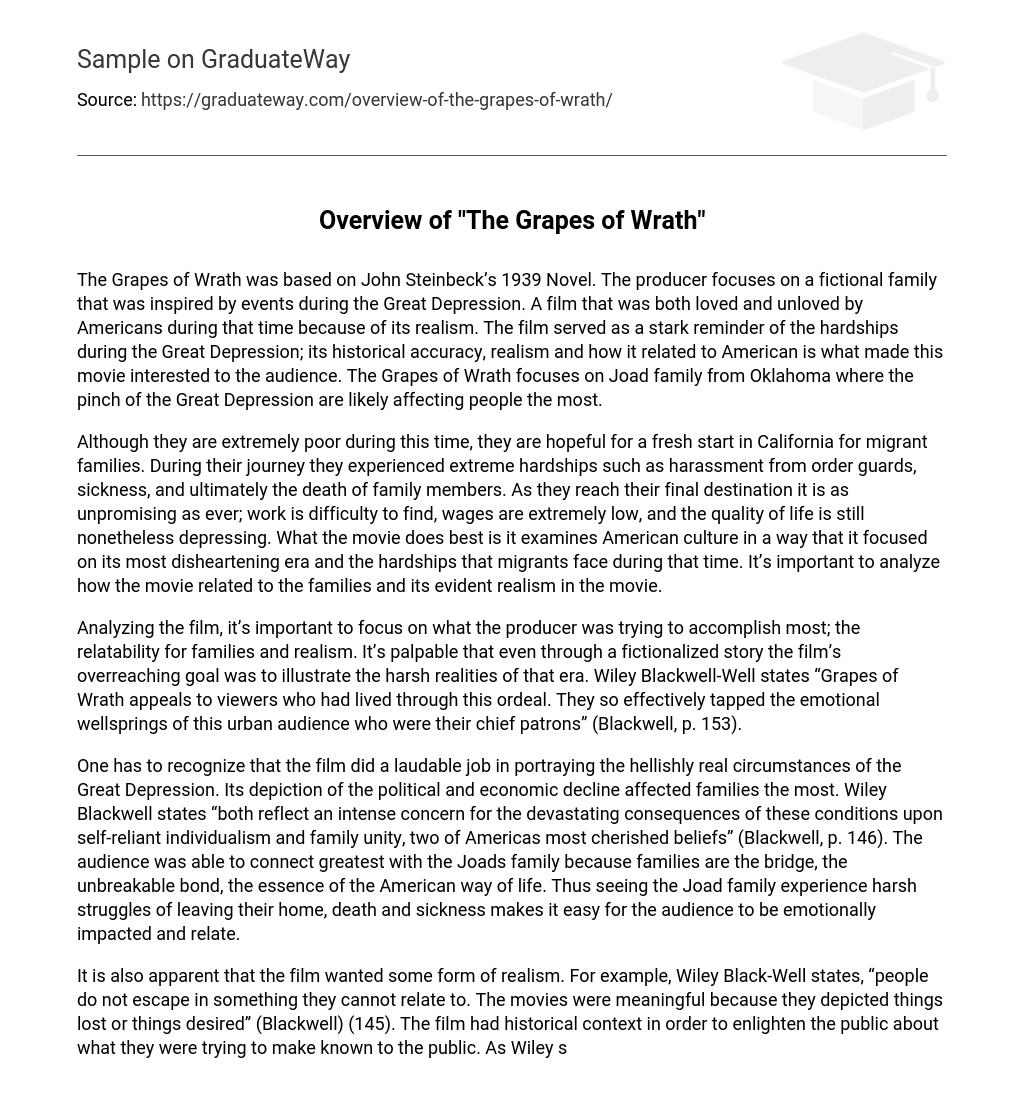The Grapes of Wrath was based on John Steinbeck’s 1939 Novel. The producer focuses on a fictional family that was inspired by events during the Great Depression. A film that was both loved and unloved by Americans during that time because of its realism. The film served as a stark reminder of the hardships during the Great Depression; its historical accuracy, realism and how it related to American is what made this movie interested to the audience. The Grapes of Wrath focuses on Joad family from Oklahoma where the pinch of the Great Depression are likely affecting people the most.
Although they are extremely poor during this time, they are hopeful for a fresh start in California for migrant families. During their journey they experienced extreme hardships such as harassment from order guards, sickness, and ultimately the death of family members. As they reach their final destination it is as unpromising as ever; work is difficulty to find, wages are extremely low, and the quality of life is still nonetheless depressing. What the movie does best is it examines American culture in a way that it focused on its most disheartening era and the hardships that migrants face during that time. It’s important to analyze how the movie related to the families and its evident realism in the movie.
Analyzing the film, it’s important to focus on what the producer was trying to accomplish most; the relatability for families and realism. It’s palpable that even through a fictionalized story the film’s overreaching goal was to illustrate the harsh realities of that era. Wiley Blackwell-Well states “Grapes of Wrath appeals to viewers who had lived through this ordeal. They so effectively tapped the emotional wellsprings of this urban audience who were their chief patrons” (Blackwell, p. 153).
One has to recognize that the film did a laudable job in portraying the hellishly real circumstances of the Great Depression. Its depiction of the political and economic decline affected families the most. Wiley Blackwell states “both reflect an intense concern for the devastating consequences of these conditions upon self-reliant individualism and family unity, two of Americas most cherished beliefs” (Blackwell, p. 146). The audience was able to connect greatest with the Joads family because families are the bridge, the unbreakable bond, the essence of the American way of life. Thus seeing the Joad family experience harsh struggles of leaving their home, death and sickness makes it easy for the audience to be emotionally impacted and relate.
It is also apparent that the film wanted some form of realism. For example, Wiley Black-Well states, “people do not escape in something they cannot relate to. The movies were meaningful because they depicted things lost or things desired” (Blackwell) (145). The film had historical context in order to enlighten the public about what they were trying to make known to the public. As Wiley states “The Grapes of Wrath was both a powerful condemnation of the exploitation of migrant farm laborers and poignant portrayal of a family persistence in the face of hardship and loss” (Blackwell, p. 148). This could very well be the message that the film wanted to portray to the audience. For the audience this creates feelings of empathy towards the characters and family, but also enlightenment of who’s at fault (the government) and who’s the victim (migrant families).
In conclusion, I agree with most with the authors analysis of the film. For example, he states “Grapes of Wrath reflects an intense concern for the devastating consequences of the conditions upon self-reliant individualism and family unity, two of Americas most cherished beliefs” (Blackwell, p. 146). This is a powerful argument that demonstrates that the films whole idea was not only to educate the audience of the effects of the Great Depression but to make an effort to make the film relatable to Americans.
This is important as the film meant to capture the injustices of Americans during a difficult time in American history. Though I disagree with the analysis of the author where he states” The Grapes of Wrath is a fine movie, but it considerably flawed. Furthermore, for all its “documentary” technique, it is badly distorted history” (Blackwell, p. 148). While I understand the authors perspective; however, I believe the film served as a powerful way for generations to visualize the flaws of history even through a fictional family. Grapes of Wrath film is not a documentary, but has inspired me to do research of my own to understand more of the Great Depression.
Bibliography
- Blackwell, W. (n.d.). Hollywood’s America. In R. R. Steven Mintz, Understanding History Through Film (Vol. Fifth Edition ).





